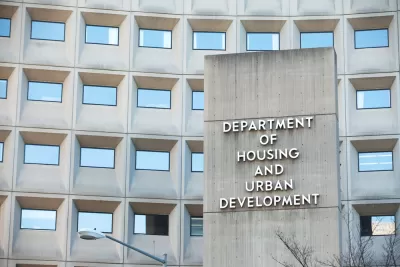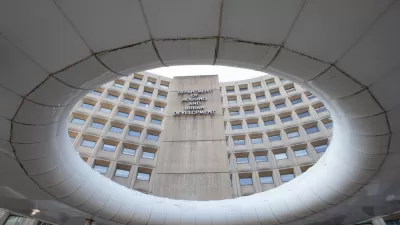A revised U.S. Department of Housing and Urban Development rule makes it more difficult to submit claims of housing discrimination when a landlord's decisions is influenced by a third-party tenant screening service.

The Department of Housing and Urban Development (HUD) changed rules regulating housing discrimination complaints to immunize landlords from discrimination charges, "if they use 'profit' as a reason for their decision-making, or if they use third-party systems to choose tenants," reports Lauren Kirchner. Among landlords, 90% use similar screening services to assess prospective tenants, according to The Markup and a New York Times investigative report.
The Trump administration's new HUD rule effectively dropping discrimination charges related to decision-making influenced by third-party screening services stirred dissent in fair housing proponents. "Even mortgage lenders and realtors eventually distanced themselves from HUD’s proposal—some of them invoking this summer’s seeds of a national reckoning over systematic racism in America," Kirchner says.
While HUD is loosening the rules for the use of algorithm-based screening systems, a groundbreaking Connecticut federal district court trial will decide whether CoreLogic, an algorithmic tenant screening services behind “CrimSAFE," is guilty of housing discrimination in violation of the federal Fair Housing Act. The case is likely the first lawsuit to target a screening company, rather than a landlord, for housing discrimination.
The algorithms behind CrimSAFE, "screens out Black and Latino applicants by relying on criminal records, and that it doesn’t give applicants the chance to explain their mitigating circumstances through more detailed, individualized assessments," explains Kirchner.
FULL STORY: Can Algorithms Violate Fair Housing Laws?

Planetizen Federal Action Tracker
A weekly monitor of how Trump’s orders and actions are impacting planners and planning in America.

Maui's Vacation Rental Debate Turns Ugly
Verbal attacks, misinformation campaigns and fistfights plague a high-stakes debate to convert thousands of vacation rentals into long-term housing.

San Francisco Suspends Traffic Calming Amidst Record Deaths
Citing “a challenging fiscal landscape,” the city will cease the program on the heels of 42 traffic deaths, including 24 pedestrians.

Defunct Pittsburgh Power Plant to Become Residential Tower
A decommissioned steam heat plant will be redeveloped into almost 100 affordable housing units.

Trump Prompts Restructuring of Transportation Research Board in “Unprecedented Overreach”
The TRB has eliminated more than half of its committees including those focused on climate, equity, and cities.

Amtrak Rolls Out New Orleans to Alabama “Mardi Gras” Train
The new service will operate morning and evening departures between Mobile and New Orleans.
Urban Design for Planners 1: Software Tools
This six-course series explores essential urban design concepts using open source software and equips planners with the tools they need to participate fully in the urban design process.
Planning for Universal Design
Learn the tools for implementing Universal Design in planning regulations.
Heyer Gruel & Associates PA
JM Goldson LLC
Custer County Colorado
City of Camden Redevelopment Agency
City of Astoria
Transportation Research & Education Center (TREC) at Portland State University
Jefferson Parish Government
Camden Redevelopment Agency
City of Claremont





























